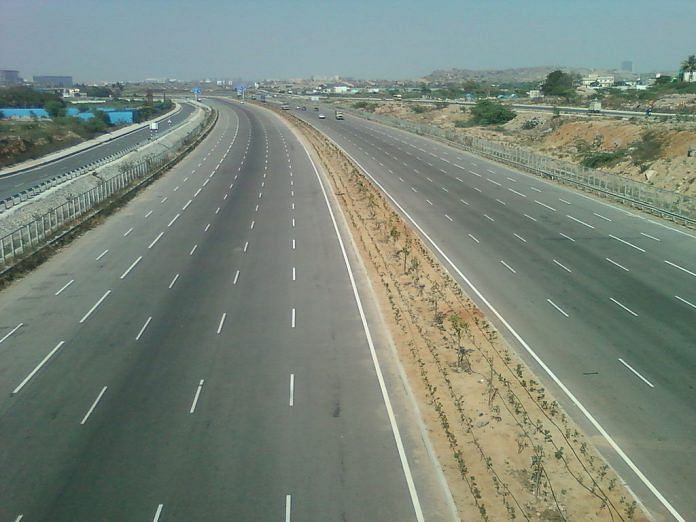New Delhi: The Modi government is working towards rolling out a pilot project to construct electric highways in India. Sources in the road ministry said the first stretch of e-highways is likely to be completed by mid-2022.
An electric highway or electric road recharges the batteries of vehicles driving on it. It is considered an energy-efficient option and helps in reducing carbon footprint.
The e-highway project has been a keen focus area for Union Road Transport and Highways Minister Nitin Gadkari. In an interview with PTI in 2016, Gadkari had said India may soon have an ‘electric highway’ stretch, similar to the one in Sweden.
Last year, he said that talks were on with a Swedish firm for an electric highway on Delhi-Mumbai Expressway. And during Question Hour in the Lok Sabha in March this year, the Union Minister said, “Buses and trucks can ply on this e-highway at a speed of 120 kmph and will bring down the logistics cost by 70 per cent.”
The first stretch where the government is considering rolling out the project is the 200 km-long Delhi-Jaipur highway on the Delhi-Mumbai Expressway, where 20 per cent of the roads will be electrified, the sources said. A separate lane will be built to recharge the batteries of cargo trucks and other electric vehicles.
A National Highways Authority of India (NHAI) official, however, told ThePrint that the project was still in “preliminary stages”.
Sources added that meetings between the road ministry and industry partners to discuss technology required to build e-highways were to be held in April but were delayed due to the second Covid wave.
Electric highways in India will focus on trucks and freight transport that carries white goods such as refrigerators, washing machines, air conditioners, and FMCG products.
Also read: How commercial vehicles are leading India’s electric vehicle revolution
Talks on with 4 companies, PPP model likely
Sources in the road ministry said they are in talks with four companies, including a German-based company, an Israel-based company, and a Swedish company.
The budgeting for the electrical highways will be through the PPP model (private-public partnership), where the government will provide incentives to industry partners to roll out the technology on highways and provide land for the same, while original equipment manufacturers (OEMs) will install the contact arm in vehicles.
An official at an e-highway technology company said that they have been in talks with the Modi government since 2017 and that the technology has already been rolled out.
Part of govt push for e-vehicles
E-highways are also a part of the Modi government’s efforts to encourage people to switch to electrical vehicles.
In the 2019 Union budget, Finance Minister Nirmala Sitharaman had announced income tax exemption of up to Rs 1.5 lakh for people who would buy e-vehicles on a loan. The central government also brought down GST rates from 12 to 5 per cent in 2019. Through the FAME (Faster Adoption and Manufacturing of (Hybrid &) Electric Vehicles) scheme, the government allocated Rs 10,000 crore in 2019 for three years for e-vehicles.
Speaking about e-Highways as part of the central government’s ambitious plans, Gadkari had said, “Just like railways, I want to see electric trucks on highways.”
A senior official in the road ministry told The Print that “Not only will e-highways help in reducing fuel consumption and are non-polluting, but also significantly help in more people turning to e-vehicles and purchasing them as the absence of charging stations and points is one of the main hindrances in people not purchasing them.
“If the overhead cables are charged by solar energy and not electricity then the e-highways will have a zero carbon footprint”, the official added.
Also read: To encourage e-mobility, Modi govt proposes exempting registration fee for battery vehicles
The technology
Three different technologies can be deployed to construct electric highways. The technology which will be implemented in India is the pantograph model where a contact arm is attached on the top of the freight or electric vehicle which is connected to an overhead cable that is electrically charged for that stretch of the highway. Germany used the same technology to build its electric roads.
The other two technologies are the conduction method, in which the contact arm for the motor vehicle is at the bottom and connects to the road to be charged. In the conduction method, the road is required to have an electromagnetic current. The third one is the induction model, where there is no contact arm and the vehicle is charged through an electro-magnetic technology which has to be installed on both the roads and the vehicle.
Sweden used the conduction model to build e-highways.
Experts explained that the pantograph model was the most feasible for India as it was similar to railways, along with being cost-effective.
E-highways across the world
Electrified roads have already been opened in Sweden and Germany.
In 2018, Sweden opened the world’s first electrified road that recharges the batteries of cars and trucks driving on it. In 2019, Germany introduced the first electric highway on its motorway system to recharge hybrid trucks on the go. It was built by Siemens and was 6 miles long, just south of Frankfurt.
There have also been reports of electrified roads and highways being built in the United Kingdom and the United States.
Siemens has estimated that if 30 per cent of Germany’s roads were electrified, then the country would reduce its carbon dioxide emissions by seven million tonnes, and saving for fuel would be as much as 16,000 euros per 1,00,000 km. Similarly, a government-funded report in the United Kingdom in July 2020 found that a majority of carbon dioxide emissions could be eliminated by installing overhead cables on e-highways.
(Edited by Neha Mahajan)
Also read: Jaguar launches its first electric SUV in India but not many may be able to afford it



